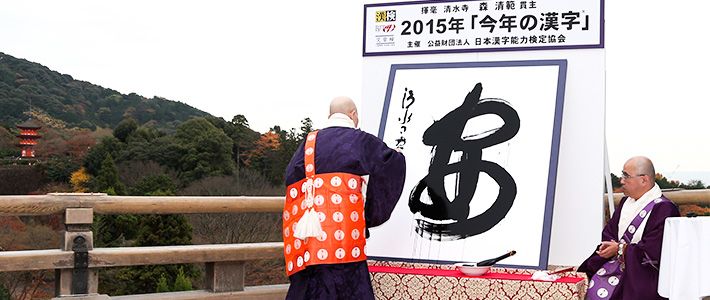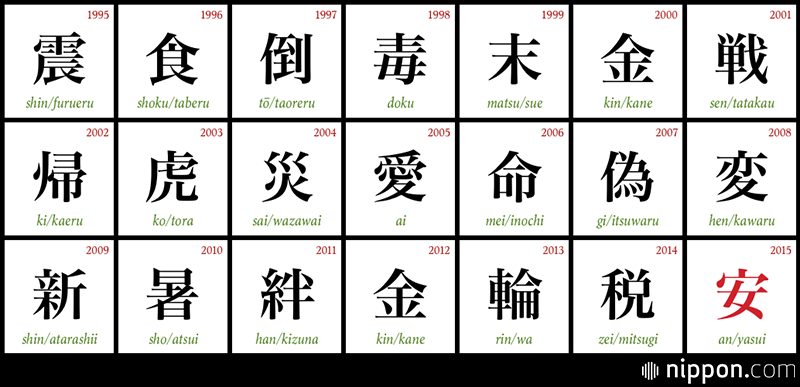
2015 Kanji of the Year: “An” Juxtaposes Security and Unease
Society Culture- English
- 日本語
- 简体字
- 繁體字
- Français
- Español
- العربية
- Русский
As the year draws to a close, kanji lovers turn their attention to the famous 13-meter-high wooden platform at Kyoto’s Kiyomizudera for the unveiling of the Kanji of the Year. The annual event, which is sponsored by the Japan Kanji Aptitude Testing Foundation, took place on December 15 in 2015.
This was three days later than its normal date on “Kanji Day,” chosen for the homophonous wordplay associating the numbers 12/12 with the phrase ii ji ichi ji, or “a single good character.” The delay seemed to raise anticipation, however, as Mori Seihan, the chief priest of the celebrated temple, carefully wrote the kanji most evoking society’s thoughts and emotions over the year.
A Multifaceted Character
The winning kanji for 2015 is 安 (an; yasui). On its own this character signifies “contentment” or “peace,” as well as “inexpensive.” Public polling decides the winning kanji. This year an garnered 5,632 votes, or 4.3% of the 129,647 ballots cast.
The kanji played a prominent role in the tumult surrounding Prime Minister Abe (安倍) Shinzō’s efforts to pass his security (安全保障, anzen hoshō) bills, while protesters voiced their concerns over the future of the peace (平安, heian) Japan has enjoyed over the 70 years since the end of World War II. Some chose the character as an expression of unease (不安, fuan) over climate change as well the terrorist attacks in Paris and the beheading of Japanese freelance journalist Gotō Kenji and security firm operator Yukawa Haruna in Syria. There is some overlap with this year’s kanji and a nominee for the word of the year in the anshin (安心) in comedian Tonikaku Akarui Yasumura’s catchphrase anshin shite kudasai (haitemasu yo), which loosely translates as “don’t worry, I’m wearing underwear.”
 The complete list of winning characters since the contest began in 1995.
The complete list of winning characters since the contest began in 1995.
Balloters often give their reasons for voting for a character. A 67-year-old man from Gunma Prefecture explained his choice of an as stemming from worries about safety following the passing of the new security bills and the discovery that a construction company had faked data to cover up defective pilings at a high-rise condominium complex in Kanagawa Prefecture. Moving down a generation, a 36-year-old woman from Mie Prefecture voiced concern over the premier and his security legislation, as well as food safety—a worry for some in the light of Japan moving toward joining the Trans-Pacific Partnership. A 15-year-old high school student from Okayama Prefecture articulated her concern about social amity, citing, among other news stories, an elderly man who in June doused himself in fuel and set light to it while aboard the Tōkaidō Shinkansen, an incident that also saw another passenger die from smoke inhalation.
A Volatile Year
Coming in second with 4,929 votes was 爆 (baku), meaning “explosive.” As the number of foreign tourists to Japan continues to climb, Chinese visitors have become especially known for their “explosive buying” habits—bakugai, another candidate for word of the year—giving a welcome bump to the economy. The rumblings of volcanoes were also on people’s minds, with 2015 seeing a string of eruptions, including Mount Aso in Kumamoto Prefecture and Mount Shindake on the island of Kuchinoerabujima in Kagoshima Prefecture. Many people looked to the character to solemnly commemorate the seventieth anniversary of the atomic bombings of Hiroshima and Nagasaki, while others saw it symbolizing the breakout popularity of rugby following the Japanese national team’s performance at the Rugby World Cup in England.
Coming in third place, with 4,556 votes, was the character 戦 (sen; tatakau), which many saw representing the various fights that unfolded in 2015, such as over the security bills, the battle with terrorism, and the Brave Blossoms’ struggle in snatching a win from rugby powerhouse South Africa.
The following kanji rounded out the top 10 list.| 4. | 結 (ketsu; musubu) | Tie or join | 3,606 votes |
| 5. | 五 (go; itsutsu) | Five | 3,339 votes |
| 6. | 賞 (shō) | Prize or reward | 2,083 votes |
| 7. | 偽 (gi; itsuwaru) | Deceive; counterfeit | 1,893 votes |
| 8. | 争 (sō; arasou) | Dispute | 1,875 votes |
| 9. | 変 (hen; kawaru) | Strange; change | 1,819 votes |
| 10. | 勝 (shō; katsu) | Victory | 1,735 votes |
Kiyomizudera language calligraphy terrorism kanji of the year security bills